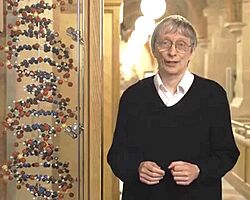David Deutsch facts for kids
Quick facts for kids
David Deutsch
|
|
|---|---|
| דוד דויטש | |
 |
|
| Born |
David Elieser Deutsch
18 May 1953 Haifa, Israel
|
| Education | William Ellis School |
| Alma mater | Clare College, Cambridge (BA) Wolfson College, Oxford (DPhil) |
| Known for |
|
| Awards |
|
| Scientific career | |
| Fields | Theoretical physics Quantum information science |
| Institutions | University of Oxford Clarendon Laboratory |
| Thesis | Boundary effects in quantum field theory (1978) |
| Doctoral advisor | |
| Doctoral students | Artur Ekert |
David Elieser Deutsch (pronounced DOYTCH; born on May 18, 1953) is a British physicist who works at the University of Oxford. Many people call him the "father of quantum computing". He is a visiting professor at the Centre for Quantum Computation (CQC) in Oxford. David Deutsch was one of the first to explore quantum computation. He created a way to describe a quantum Turing machine and designed an algorithm for quantum computers. He also supports the idea of the many-worlds interpretation in quantum mechanics.
Contents
Early Life and Education
David Deutsch was born in Haifa, Israel, on May 18, 1953. His parents were Oskar and Tikva Deutsch. He grew up in London, where he went to Geneva House school. Later, he attended William Ellis School in Highgate.
For his college studies, he went to Clare College, Cambridge, where he studied Natural Sciences. He then earned his doctorate (DPhil) in theoretical physics from Wolfson College, Oxford. His research focused on quantum field theory.
Career and Research
David Deutsch started his important work on quantum algorithms in 1985. He later worked with Richard Jozsa in 1992 to create the Deutsch–Jozsa algorithm. This was one of the first quantum algorithms that could solve problems much faster than any regular computer.
In 2008, when he was chosen as a Fellow of the Royal Society, his work was praised. People noted that he "laid the foundations of the quantum theory of computation." He also helped create the first quantum algorithms, quantum logic gates, and ways to fix errors in quantum computing. His work has guided research around the world in this new field. He also helped explain these complex ideas to everyone, especially in his book The Fabric of Reality.
Since 2012, David Deutsch has been working on something called constructor theory. This theory tries to explain all physical processes, not just computing. In 2014, he and Chiara Marletto published a paper about this. They suggested that information can be understood by looking at what changes are possible or impossible for physical systems.
Understanding The Fabric of Reality
In his 1997 book, The Fabric of Reality, Deutsch shares his "Theory of Everything." This theory doesn't try to reduce everything to tiny particles. Instead, it suggests that different ideas support each other. These ideas include the multiverse, computation, how we gain knowledge, and how things evolve.
His theory has four main parts:
- Hugh Everett's many-worlds interpretation of quantum physics. This is the most important part.
- Karl Popper's ideas on how we learn and test knowledge. This includes the idea that scientific theories should be realistic.
- Alan Turing's theory of computation. Deutsch updated this with his universal quantum computer.
- Richard Dawkins' ideas about evolution, especially how ideas (called memes) spread and change.
What are Invariants?
In a 2009 TED talk, Deutsch talked about how to find good scientific explanations. He said that good explanations should be "invariants." This means they should stay true even when new information or changes appear.
He explained:
- "A bad explanation is easy to vary."
- "The search for hard-to-vary explanations is the origin of all progress."
- "That the truth consists of hard-to-vary assertions about reality is the most important fact about the physical world."
The idea of "invariance" has been important in science for a long time. Many famous scientists and thinkers have written about it.
About The Beginning of Infinity
Deutsch's second book, The Beginning of Infinity: Explanations that Transform the World, came out in 2011. In this book, he sees the European Enlightenment (from the 1600s to 1700s) as the start of a never-ending journey of creating useful knowledge. He explores what knowledge is, how ideas spread (memes), and why humans developed creativity.
Awards and Honours
The Fabric of Reality was nominated for the Rhone-Poulenc science book award in 1998. Deutsch received the Dirac Prize from the Institute of Physics in 1998. He also won the Edge of Computation Science Prize in 2005. In 2017, he was given the Dirac Medal by the International Centre for Theoretical Physics (ICTP).
David Deutsch was chosen as a Fellow of the Royal Society (FRS) in 2008. In 2018, he received the Micius Quantum Prize. In 2021, he was awarded the Isaac Newton Medal and Prize. On September 22, 2022, he shared the Breakthrough Prize in Fundamental Physics with Charles H. Bennet, Gilles Brassard, and Peter Shor.
Personal Life
David Deutsch is a founding member of a group that supports a parenting and education method called Taking Children Seriously.
Views on Public Issues
David Deutsch has shared his thoughts on how public concerns are handled. He believes that in some systems, it's easier to make your voice heard and see changes happen. He has noted that in Britain, people can join groups or talk to their elected representatives to address problems. He has also commented that in other systems, it can be harder to know who to talk to or what steps to take to resolve an issue.
See also
- Deutsch gate
- Wigner's friend
- Quantum cellular automaton
- Quantum mechanics of time travel

